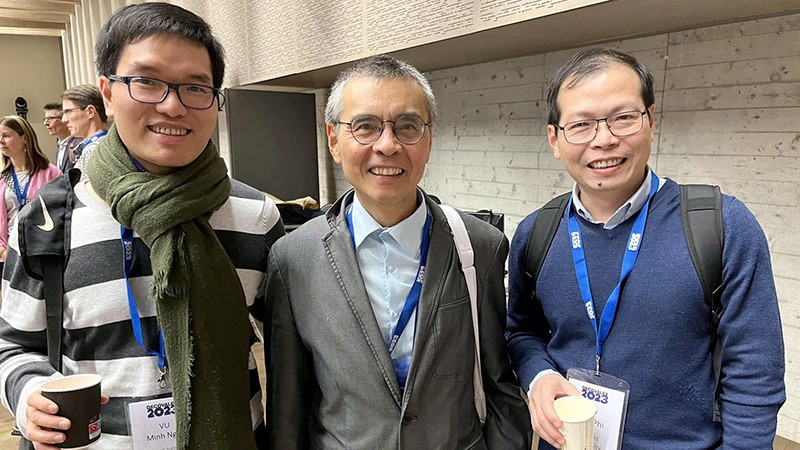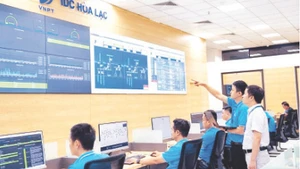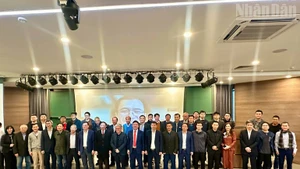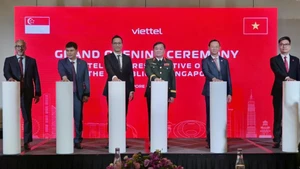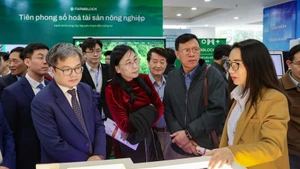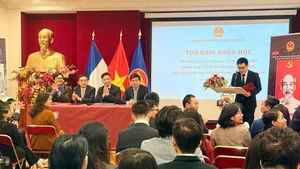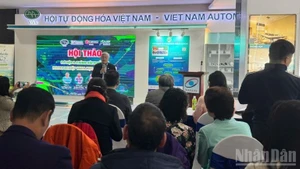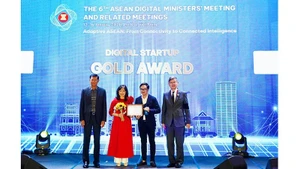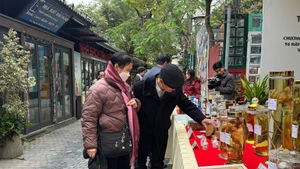Q: What brought you to France and study the field of nuclear technology?
A: After graduating in 2006 from the High-Quality Engineering Programme in Transportation Infrastructure at the University of Civil Engineering, I returned to teach in the Department of Bridges, Roads and Airports at the Military Technical Academy. In 2008, I went to France to pursue a master’s degree in Soil Mechanics at the École des Ponts ParisTech. I graduated as the top student of my class and was awarded the title of Outstanding Vietnamese Graduate Student in France in 2009 by the Union of Vietnamese Students in France (UEVF). Since then, I have remained closely connected to France and the field of nuclear technology.
To date, I have successfully supervised 10 PhD students and am currently guiding 14 doctoral candidates, including three from Viet Nam. I have authored or co-authored more than 145 papers published in prestigious international journals in the field of geomechanics, specifically related to the deep geological disposal of nuclear waste.
Q: Scientific research in such a specialised field must be incredibly interesting, isn’t it?
A: My work involves both theoretical development and modelling, as well as laboratory and in situ experimentation. In the field of nuclear waste management, every potential risk scenario must be thoroughly identified and addressed to demonstrate that such risks will not occur under the designed conditions. This opens many avenues for new scientific ideas. Moreover, I have had the privilege of working with many renowned professors in my field from France and countries such as Belgium, Spain, Germany, the Netherlands, Canada, the US, Japan, and the Republic of Korea (RoK). Together, we share and materialise our ideas.
Leading professors usually attract top-tier students to pursue doctoral research. As a result, my projects tend to be very successful, with many findings published in high-impact scientific journals. While passion for science is a prerequisite, sharing ideas within the research team is also crucial for producing high-quality studies. When colleagues listen to one another, the principle that "one plus one is greater than two" truly comes to life, making our work much more effective. For independent researchers, while they may carry out fewer projects, their knowledge runs deep within a narrow field, and their work becomes a personal scientific masterpiece.
Q: How would you compare scientific research between Viet Nam and France after having conducted nearly 20 research projects in France?
A: Scientific research in France and Viet Nam reflects the distinct historical, cultural, and economic contexts of the two countries. France boasts a long-standing tradition of scientific research, particularly in the natural sciences, mathematics, physics, chemistry, medicine, and engineering. Research in France benefits from substantial government funding and support from private organisations. The country is equipped with advanced infrastructure, including state-of-the-art laboratories and research facilities, and actively promotes international collaboration, attracting scientists from around the world.
In recent years, research in Viet Nam has been advancing rapidly within a context of innovation, with increasing attention and investment from the Party and the state in science and technology. However, as a developing country, Viet Nam tends to prioritise research that addresses national challenges, such as economic development, environmental protection, and healthcare — often by leapfrogging through technology adoption.
I hope that in the near future, universities in Viet Nam will be equipped with more laboratories, and that the salaries of lecturers and researchers will be improved so they can fully dedicate themselves to their work and contribute to the development of national science. Furthermore, I hope the government will introduce clearer policies to encourage the many overseas Vietnamese scientists who are eager to return and contribute their enthusiasm to Viet Nam’s education and scientific research. I am also filled with hope that the Politburo’s Resolution No.57 will bring a fresh wave of momentum to the country’s scientific efforts.
Q: What is your perspective on the current prospects for nuclear energy development?
A: Russia was the first country to operate a nuclear power plant, which began running in 1954 in the city of Obninsk. Today, there are approximately 440 nuclear reactors generating electricity in 32 countries worldwide. The US, France, China, Russia, and the RoK are the nations with the largest number of nuclear reactors. Globally, nuclear energy contributes to around 10–15% of total electricity production. Among the countries developing nuclear power, France stands out as having the highest proportion, with about 65% of its electricity is generated from nuclear reactors.
Nuclear power plays a vital role in ensuring energy security and mitigating climate change, especially in the context of growing global energy demand. The nuclear energy industry is currently undergoing a phase of innovation and expansion. The advantages of nuclear energy include a stable energy source (nuclear power can operate all day and is not weather-dependent), low carbon emissions (nuclear plants emit no greenhouse gases during operation), and high efficiency (nuclear facilities can generate large amounts of electricity on a relatively small footprint). However, nuclear power also faces considerable challenges, particularly regarding safety, high investment costs to ensure safe operations, and the management of radioactive waste.
Q: Many Vietnamese people are particularly concerned about the handling and management of radioactive waste. What recommendations or insights can you offer regarding this issue, especially as Viet Nam prepares to build the Ninh Thuan nuclear power plant?
A: From a purely technical standpoint, I do not believe that managing high-level radioactive waste is an unsolvable problem. Most countries have been researching deep geological storage solutions for high-level radioactive waste. For example, France has chosen a thick clay layer — approximately 150 metres thick and located about 500 metres below ground — as the site for its nuclear waste repository. This clay formation, which developed more than 300 million years ago, has extremely low permeability and a large thickness, making it suitable for containing radioactive materials underground.
After more than 30 years of research, France has conducted numerous underground experiments, laboratory tests, theoretical studies, and developed modelling systems to account for every factor that could affect the repository’s performance. Moreover, many nuclear-powered countries consider this the most effective solution currently available. Finland and Sweden, for instance, have already approved the construction of such facilities.
Given the many advantages and challenges of nuclear power, its development remains a matter of debate and is heavily influenced by the political context of each country. While several nations, such as France, China, and Russia, continue to expand their nuclear programmes, others, like Germany, Italy, and Switzerland, have opted to phase them out. Major technology companies such as OpenAI, Meta, Google, and Microsoft have also shown interest and invested in nuclear energy projects as a stable power supply for data centres, which are key to AI development.
Q: As a nuclear energy expert working abroad, what message of confidence would you like to share regarding the Vietnamese government's decision to restart the Ninh Thuan nuclear power project?
A: From a personal standpoint, I believe the decision to revive the Ninh Thuan nuclear power project is a sound and timely one, reflecting Viet Nam’s urgent needs in its new phase of development. It is intended to meet the country’s growing energy demand, reduce carbon emissions in line with the government’s commitment to achieve carbon neutrality by 2050 under the international Net Zero initiative, and strengthen national energy security.
Viet Nam currently relies heavily on fossil fuels, particularly coal and hydropower. However, these resources are finite and have significant negative environmental impacts. Nuclear energy can help diversify the country's energy sources, reduce dependence on fossil fuels, and contribute to the long-term energy security of the nation.
Developing the nuclear industry will also drive advancements in science and technology within Viet Nam, particularly in fields such as materials science, mechanical engineering, electronics, and information technology. This can bring significant long-term benefits to the Vietnamese economy and society.
Many countries around the world have used nuclear energy safely and efficiently. Viet Nam can learn from their experiences to develop its own nuclear industry in a sustainable way. Furthermore, there are many Vietnamese professionals currently working in all aspects of nuclear power projects abroad, from planning to operation, especially in France, which serves as a prime example. These individuals are always ready to contribute to the success of Viet Nam’s nuclear ambitions.
Radioactive waste management remains one of the greatest challenges for countries pursuing nuclear power. This is also the area in which I am directly involved in France, and I hope to make a small contribution to the success of the Ninh Thuan nuclear power plant project.
Thank you very much!
